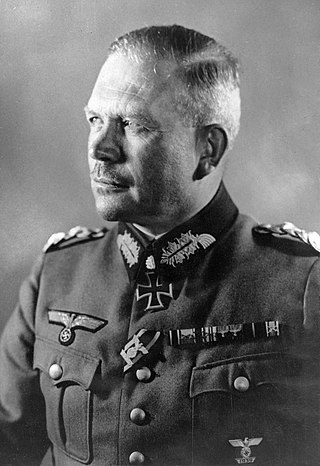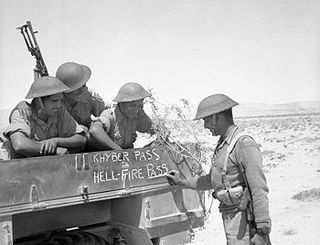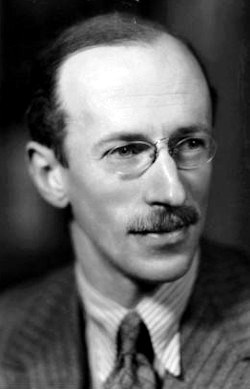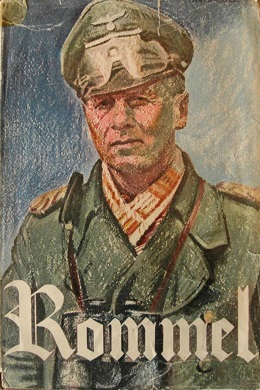
Blitzkrieg is a word used to describe a combined arms surprise attack, using a rapid, overwhelming force concentration that may consist of armored and motorized or mechanized infantry formations, together with artillery, air assault, and close air support. The intent is to break through an opponent's lines of defense, dislocate the defenders, confuse the enemy by making it difficult to respond to the continuously changing front, and defeat them in a decisive Vernichtungsschlacht: a battle of annihilation.

Johannes Erwin Eugen Rommel, popularly known as The Desert Fox, was a German Generalfeldmarschall during World War II. He served in the Wehrmacht of Nazi Germany, as well as in the Reichswehr of the Weimar Republic, and the army of Imperial Germany.

The Second Battle of El Alamein was a battle of the Second World War that took place near the Egyptian railway halt of El Alamein. The First Battle of El Alamein and the Battle of Alam el Halfa had prevented the Axis from advancing further into Egypt.

Heinz Wilhelm Guderian was a German general during World War II who, after the war, became a successful memoirist. An early pioneer and advocate of the "blitzkrieg" approach, he played a central role in the development of the panzer division concept. In 1936, he became the Inspector of Motorized Troops.

Infantry Attacks is a classic book on military tactics written by Erwin Rommel about his experiences in World War I. At the time of the book's writing in the mid-1930s, Rommel's rank was lieutenant colonel. Rommel had planned to write a successor called Panzer Greift An about tank warfare, and gathered much material during the North Africa Campaign. However, as a result of his perceived involvement in a failed assassination attempt of Adolf Hitler, he was forced to commit suicide before completing this work.

The Battle of Kasserine Pass took place from 18-24 February 1943 at Kasserine Pass, a 2-mile-wide (3.2 km) gap in the Grand Dorsal chain of the Atlas Mountains in west central Tunisia. It was a part of the Tunisian campaign of World War II.

Operation Battleaxe was a British Army offensive during the Second World War to raise the Siege of Tobruk and re-capture eastern Cyrenaica from German and Italian forces. It was the first time during the war that a significant German force fought on the defensive. The British lost over half of their tanks on the first day and only one of three attacks succeeded.

Operation Brevity was a limited offensive conducted in mid-May 1941, during the Western Desert Campaign of the Second World War. Conceived by the commander-in-chief of the British Middle East Command, General Archibald Wavell, Brevity was intended to be a rapid blow against weak Axis front-line forces in the Sollum–Capuzzo–Bardia area of the border between Egypt and Libya. Although the operation got off to a promising start, throwing the Axis high command into confusion, most of its early gains were lost to local counter-attacks, and with German reinforcements being rushed to the front the operation was called off after one day.

The Battle of Alam el Halfa took place between 30 August and 5 September 1942 south of El Alamein during the Western Desert Campaign of the Second World War. Panzerarmee Afrika, attempted an envelopment of the British Eighth Army. In Unternehmen Brandung, the last big Axis offensive of the Western Desert Campaign, Rommel intended to defeat the Eighth Army before Allied reinforcements arrived.

Hans–Ulrich Freiherr von Luck und Witten, usually shortened to Hans von Luck, was a German officer in the Wehrmacht of Nazi Germany during World War II. Von Luck served with the 7th Panzer Division and 21st Panzer Division. Von Luck is the author of the book Panzer Commander.
This is a timeline of the North African campaign of World War II.

The King Cetshwayo Artillery Regiment is a reserve artillery regiment of the South African Army.
The Theresian Military Academy is a military academy in Austria, where the Austrian Armed Forces train their officers. Founded in 1751, the academy is located in the castle of Wiener Neustadt in Lower Austria.

The Battle of Mersa Matruh was fought from 26 to 29 June 1942, following the defeat of the Eighth Army at the Battle of Gazala and was part of the Western Desert Campaign of the Second World War. The battle was fought with the German–Italian Panzer Army Afrika (Panzerarmee Afrika. The Eighth Army comprised X Corps and XIII Corps.

Operation Skorpion from 26 to 27 May 1941, was a military operation during the Western Desert Campaign of the Second World War. The operation was conducted by Axis forces under the command of Colonel Maximilian von Herff and British forces under Lieutenant-General William "Strafer" Gott. A counter-attack was made on British positions at Halfaya Pass in north-western Egypt, which had been captured during Operation Brevity (15–16 May).Unternehmen Skorpion was the second offensive operation commanded by Rommel in Africa.

Sir Basil Henry Liddell Hart, commonly known throughout most of his career as Captain B. H. Liddell Hart, was a British soldier, military historian, and military theorist. He wrote a series of military histories that proved influential among strategists. Arguing that frontal assault was bound to fail at great cost in lives, as proven in World War I, he recommended the "indirect approach" and reliance on fast-moving armoured formations.
This article discusses the problem represented by land mines in North Africa, the consequent suffering of its peoples, and how the countries in the region deal with this problem.
The Rommel myth, or the Rommel legend, is a phrase used by a number of historians for the common depictions of German Generalfeldmarschall Erwin Rommel as an apolitical, brilliant commander and a victim of Nazi Germany due to his presumed participation in the 20 July plot against Adolf Hitler, which led to Rommel's forced suicide in 1944. According to these historians, who take a critical view of Rommel, such depictions are not accurate.

Rommel: The Desert Fox is a 1950 biography of German Field Marshal Erwin Rommel by Desmond Young. The book was the first biography of Rommel and enjoyed immense popularity, especially in Britain. The book led the Western Allies, particularly the British, to depict Rommel as the "good German" and "our friend Rommel", contributing to the formation of the Rommel myth.

The Rommel Papers is the collected writings by the German World War II field marshal Erwin Rommel published in 1953.














